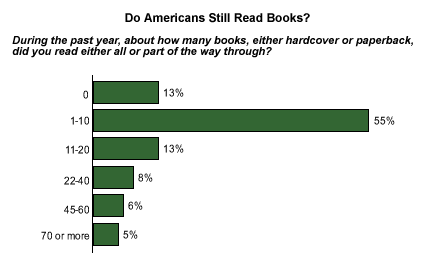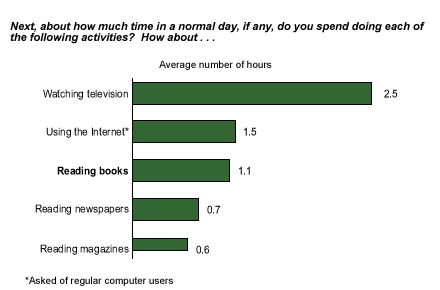"Read for pleasure. Read what you like, and all you like. Read literally to your heart's content," best-selling author David McCullough said in a 1999 University of Connecticut commencement speech. Americans seem to be taking his advice -- when Gallup asked Americans in 2001* how many books they read a year, the average was more than 14.
But book publishers are nervous anyway. Though several cities and even whole states have implemented reading programs and libraries across the country continue to offer book discussion groups, the economics of bookselling have become especially dismal lately.

According to the Association of American Publishers (AAP), book sales were up only 0.1% in 2001 totaling a little over $25 billion. In May, Michael Cader, the president of Cader Books, told the Washington Post that book publishing "is in a mathematical death spiral."
Television is at least partly to blame. No surprise there -- according to a recent Gallup survey, Americans spend an average 2.5 hours watching the tube on a normal day, compared to 1.1 hours reading books. However, those who fretted that the Internet would ring the death knell for books are still listening for it. Those who use a computer on a regular basis say they spend more time on the Internet (1.5 hours per day) than they do reading books (1.1 hours per day). But those who regularly use computers spend as much time reading books as those who are not regular computer users (also 1.1 hours per day).

Bookworms, Unite
Although we may be married to our televisions, many of us also have a love affair with books. In a July 1999 Gallup Poll**, 58% of respondents said that on their "perfect vacation" they would try to read a book (only 43% would try to get a suntan, but 82% would try to see a museum or play and 72% would try to shop). In fact, a few Americans have done some really dumb things to squeeze in a few more minutes with a book -- 7% have admitted to reading a book, magazine or newspaper while driving.
The popularity of the Harry Potter books is a significant phenomenon in book publishing. Teachers, parents and publishers (and the books' author, J.K. Rowling) were stunned by children's passionate responses to the series -- responses that, one might hope, will result in a lifelong enjoyment of books. In July 2000***, 71% of the adult population had heard of the books. Gallup asked parents if their children had read any of the Harry Potter books, and 40% said their kids had either read the books or heard them read aloud. Twenty-nine percent said they would buy the next book the weekend it came out.
Many cultural critics have debated the value -- educational or cultural -- of popular fiction. But to most readers, such arguments are beside the point. Reading, like virtue, is its own reward, whether the literature is highbrow or lowbrow. Although reading is an intellectually engaging pursuit by nature, Americans read for pleasure more than pure edification -- we read only one book a year for school or work. Perhaps it's just as well that we read for fun and not information. As McCullough said in his commencement speech, "If information were learning, you could become educated by memorizing the World Almanac. Were you to memorize the World Almanac, you wouldn't be educated. You'd be weird."
Key Points
The publishing industry is facing some grim numbers, but the wild success of the Harry Potter series indicates that the joy of reading won't die out with today's youngest generation, either. Perhaps the best strategy for publishers isn't to avoid taking chances with unknown writers -- such as Rowling once was -- but simply to remind people to "read to their heart's content." It's what many of us do anyway.
*Results are based on telephone interviews with 512 national adults, aged 18 and older, conducted Dec. 6-9, 2001. For results based on the total sample of national adults, one can say with 95% confidence that the margin of sampling error is ±5%.
**Results are based on telephone interviews with 1,031 national adults, aged 18 and older, conducted July 16-18, 1999. For results based on the total sample of national adults, one can say with 95% confidence that the margin of sampling error is ±3%.
*** Results are based on telephone interviews with 1,001 national adults, aged 18 and older, conducted July 6-9, 2000. For results based on the total sample of national adults, one can say with 95% confidence that the margin of sampling error is ±3%.